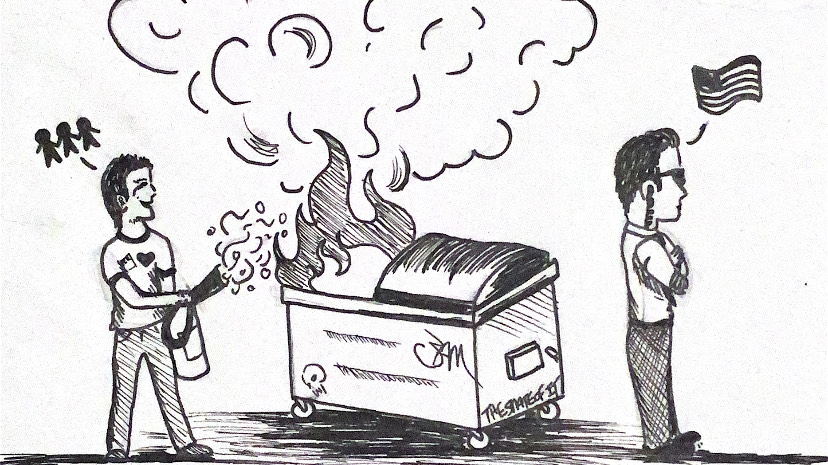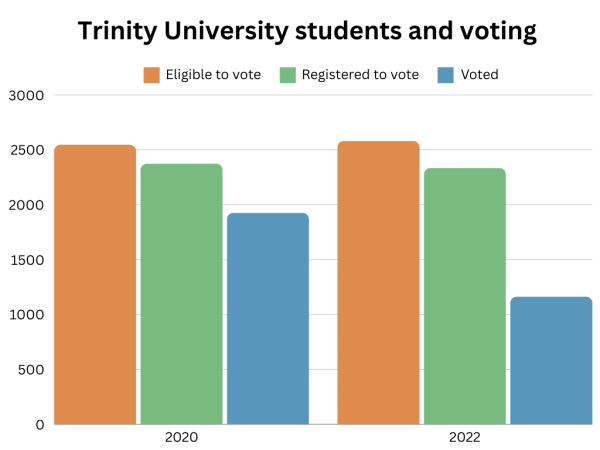Volunteerism takes government role
The U.S. government should take care of its citizens, not nonprofit organizations
Volunteering is synonymous with doing good. In our society, people who take the time to distribute food at a food bank, donate needed items to a shelter or dedicate funds to a nonprofit organization are held in high esteem because they are doing something admirable — giving back to the community. Most of these acts are done with honorable intentions, yet in the end, intentions don’t matter — results do. And these results come in the form of policy change.
One of the main purposes of volunteerism is to utilize everyday citizens’ well-natured desire to help others. This comes in a variety of forms, and whether it be philanthropy or donation, volunteerism makes an impact on our progress as a society. In turn, however, the U.S. government and its institutions are off the hook in regard to aiding the advancement of their own people. Policy and infrastructure are often ignored because of this, but they remain an important and crucial part of changing the state of poverty and other societal issues in our country.
The U.S. government should be involved in domestic humanitarian efforts because it will be held accountable by the people. Nonprofit organizations are not democratically bound to the people they serve, meaning the organization is not responsible or accountable for the people. If undesirable policies or actions are made by these organizations, there might be informal protests, but in the end, the decisions made by nonprofits are not voted on by the people, nor can they be rescinded by the people.
Addressing homelessness, mental health crisis and food insecurity should be spearheaded by U.S. governmental institutions because they are more reliable than nonprofit organizations that rely on outside factors. The nonprofit sector relies on two things the government doesn’t need: volunteers and donors. This means that the people receiving aid from nonprofits must rely on people who could withdraw their help at any time. Should the economy go sour or a global pandemic strike leaving people either unable or unwilling to volunteer time and money, there will be less available for the nonprofit sector to rely on — unlike the U.S. government.
Finally, some nonprofit activities, such as soup kitchens, perpetuate the problem of food insecurity, or a lack of access to food, because there is no policy change to pair with them. Instead, as Jordan Flaherty says in his book “No More Heroes,” more and more soup kitchens and food banks are opened. For instance, Flaherty points out that New York City had eight food providers in 1979, and by 1997, that number had reached almost 1,000 relief food providers. At face value this seems good — like there is more help for people who need it — but in the end, it means that food insecurity and its root problems like poverty and lack of quality health care are not being addressed on a systemic level.
Ideally, the ultimate goal of a nonprofit should be that the organization will eventually not exist because the issues it targeted were addressed. The government has the power and resources to both provide short-term solutions, such as food banks and shelters, and also address policy needs for systemic inequalities that keep the poor in our country poor.
The flip side to this coin is that not everyone believes the government should be held responsible for those less fortunate. These people are of the mindset that wealthier people’s hard-earned money shouldn’t go to those who don’t work for their own food and housing, yet get it for free. I would invite these individuals to browse through the founding rule of law by which we run our society. The U.S. Constitution states that the government will “promote the general welfare” of its constituents. Better yet, most of the cases of poverty in this country are not due to laziness or lack of work ethic, it’s due to systematic infrastructure that perpetuates the cycle of poverty.
While volunteering with the nonprofit sector is respectable because it often comes from a true place of wanting to help, in the long term, we must think of what this signals to our government. Independent groups who are reliant on outside factors such as volunteers and donations provide aid for individuals without the ability to make policy changes. Implementing effective policy would alleviate the problems and should lead the charge instead of the government, whose responsibility is to provide for citizen welfare. Let’s recognize that policy change is a powerful tool that can shape the problems of the U.S. and reduce the need for both governmental aid and nonprofit intervention.

I am an International Studies and Political Science major with a minor in Spanish. My passions lie in studying methods of peaceful and diplomatic interactions...

Whattup! My name is Skylar Savarin (she/her/hers), and I am the Visual section editor! I am a third-year double majoring in Human Communication and Art....






